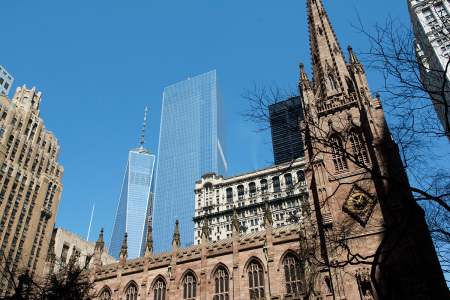Trinity Church Wall Street awards $4.6M in grants to seminaries, churches and Christian orgs

Trinity Church Wall Street in Lower Manhattan, the richest Episcopal church in the world, which boasts a diverse investment portfolio worth $6 billion, has awarded more than $4.6 million in grants to Christian organizations across the United States, Africa and Latin America.
The grants, ranging from $40,000 to $750,000, are being made to 25 organizations, including seminaries and churches committed to advancing "leadership development and building sustainable financial capacity in the Episcopal Church, the Anglican Communion and beyond," the church announced in a release Tuesday.
“Trinity continues our mission of helping churches create ministries that will not only impact their communities immediately but continue to help in years to come,” the Rev. Phillip A. Jackson, priest-in-charge of Trinity Church Wall Street, said in a statement. “We also believe in the importance of training the next generation of leaders in the Episcopal Church and are excited to announce almost $2 million in grants targeted to this purpose.”
Union Theological Seminary, which received $750,000, was the top grantee among all the organizations. Other seminaries that received grants were: Berkeley Divinity School at Yale, $150,000; Wesley Theological Seminary, $100,000; Princeton Theological Seminary, $100,000; and Auburn Theological Seminary, $100,000.
The church also granted $90,000 to The Hispanic Youth Leadership Academy for the first time to help train young people for leadership in Christian communities.
“The goal is to create a pipeline of Episcopal Latinx faith leaders from high school to their ministries, both ordained and lay,” Robert Garris, managing director for leadership development at Trinity said in a statement. “The Hispanic Youth Leadership Academy is in a unique position to engage this work because of its 17 years of experience training and mentoring young Latinx faith leaders.”
In addition to providing funding to several projects in Africa and Latin America, the church also expanded its work in the affordable housing through its work with St. Luke’s Episcopal Church in Seattle, Washington.
The church is a participant in the inaugural Gift of Place cohort of churches launched by Trinity in partnership with the CEEP Network in 2020.
St. Luke’s, according to the release, will use a $200,000 grant to fund predevelopment costs for an affordable housing project in the "rapidly gentrifying Ballard neighborhood."
“While the neighborhood includes very affluent residents, there is still a significant shortage of affordable housing as evidenced by the 40 tents set up just across the street from the church entrance. This grant is an important first step in a project that will transform an entire city block with multiple new buildings encompassing affordable and mixed-income housing as well as space for community services; revitalizing the neighborhood and strengthening the church both missionally and financially," the Rev. James Clark, managing director of Mission Real Estate Development at Trinity, said.
Trinity Wall Street is one of New York City’s most influential players in the real estate market. It boasts a diverse investment portfolio worth $6 billion thanks in large part to a gift of 215 acres of land from Queen Anne in 1705. The church still owns about 14 acres of that grant and has evolved into a “big time” developer itself.
In an interview with The Christian Post last year, Bea de la Torre, managing director of the housing and homelessness team at Trinity Wall Street, said the church has always been concerned about homelessness in the city from a “race-equity” standpoint.
“We’re really looking at addressing the intersection of racial justice and homelessness. A lot of people with justice involvement coming out of state prisons or jails have a very, very hard time securing housing. And many of them end up finding themselves revolving around these two systems,” Torre said.
She said Trinity Wall Street is very much in support of organizations that are investing in affordable housing development and that they have been involved with a new Down Payment Assistance Fund, launched in 2019, to speed the production of supportive and affordable housing across New York.
When asked how much of Trinity Church’s real estate had been dedicated to affordable housing, Torre was quick to highlight St. Margaret’s House, a 20-story apartment building that features 251 rental apartments strictly for older adults, ages 62 and older, and mobility-impaired people, ages 18 and older, who all receive Section 8 rent subsidies.
“That’s a development that we are very proud of and committed to continuing,” she said, while noting that Trinity Wall Street is also looking at different ways they can do more, including supporting faith-based institutions that want to leverage their properties to create affordable housing.
“I do think there’s great opportunities with faith-based [organizations to balance the slant toward the luxury market by developers] with land air rights, owned by faith-based institutions. It’s one of the reasons why we want to ensure that those organizations are well-equipped in terms of analyzing and assessing what they can do,” Torre said.





















